End of an era - Mark Cavendish and the Tour de France
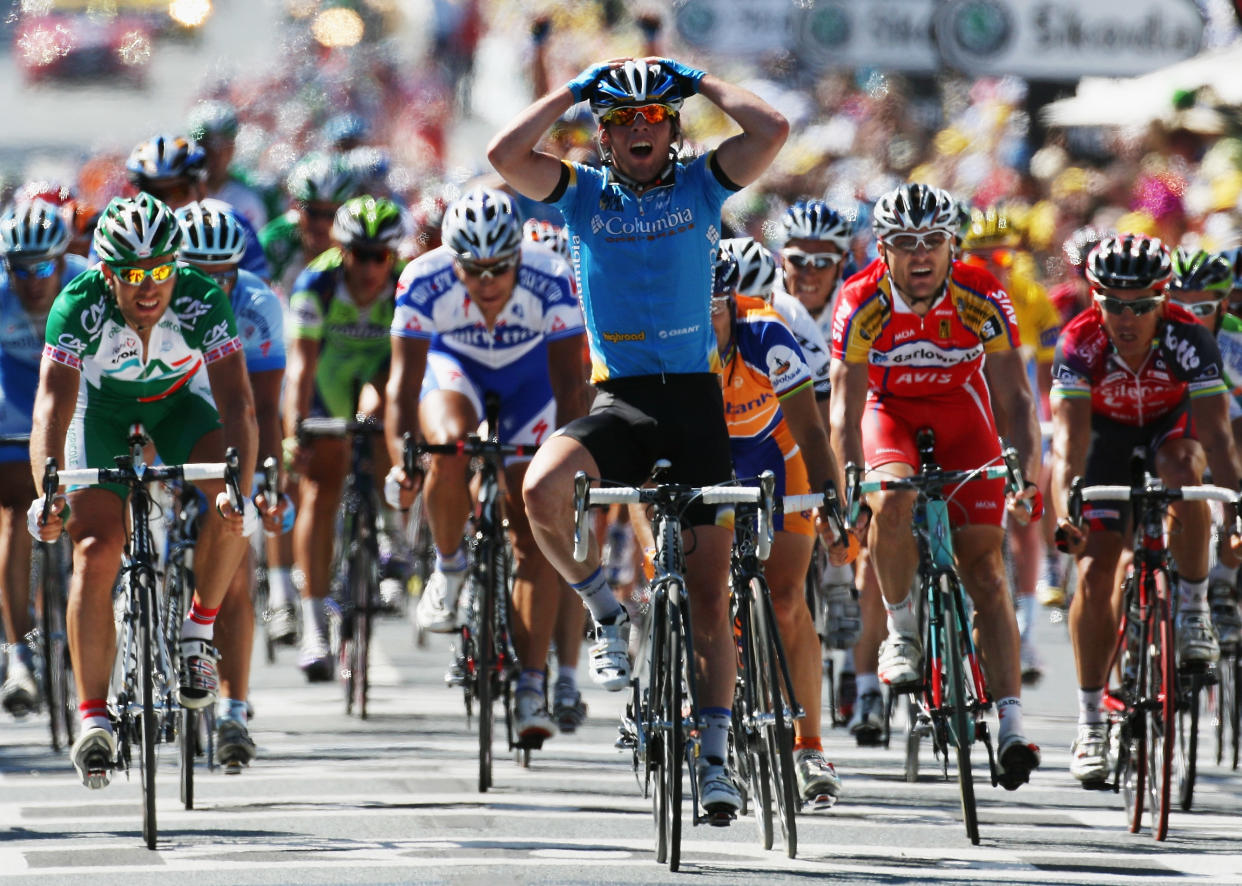
- Oops!Something went wrong.Please try again later.
- Oops!Something went wrong.Please try again later.
Mark Cavendish will start the Tour de France for a 14th and final time with the ultimate ambition of claiming his 35th stage win, which would see him surpass the record he currently shares with Eddy Merckx.
The Manxman turned 38 during the Giro d’Italia and is not as fast as he once was, but he still found a way to cross the line first. He has struggled to get to the front in most of the sprints he has contested this season though he still won in style on the final day in Rome, confirming that he should never be written off.
Year after year at the Tour de France, Cavendish has used his aerodynamic and powerful sprinting style to surge ahead of rivals with the combination of speed and determination carrying him to victory time and time again.
“Cav is Cav,” was Max Sciandri’s succinct maxim, which somehow captured Cavendish’s unique ability and character. His success earned him the moniker of ‘Cannonball’ in the British tabloids, a nickname that is still popular in Italy even today. French observers were not always as enamoured after a number of spats and controversies, but Cavendish’s years of success at the Tour consecrated him as the best sprinter in the sport.
Read more
Finishing school - Mark Cavendish and the Giro d'Italia
Mark Renshaw reunites with Mark Cavendish for final Tour de France
Mark Cavendish confirms retirement – 'I've lived an absolute dream'
Ahead of Cavendish’s final Tour, Cyclingnews casts a glance over the various phases of his relationship with the race that defined his career. There were 34 stage victories and two green jerseys, but there were also bad crashes, anger in defeat and the pain of finishing outside the time limit.
The 2023 Tour offers Cavendish the perfect scenario in which to end his professional career. Even if he fails to win another stage, he will still be celebrated one last time as the greatest sprinter of all time. For the occasion, his Astana-Qazaqstan team has even hired his old lead-out man Mark Renshaw as a ‘sprint consultant’ for the duration of the Tour.
If Cavendish wins again, particularly if he does so on the final stage on the Champs-Élysées, he could even end his career there and then, with a mic drop sign-off. He would have nothing else to prove.
2007: London debut ends in tears, but sparks a love affair
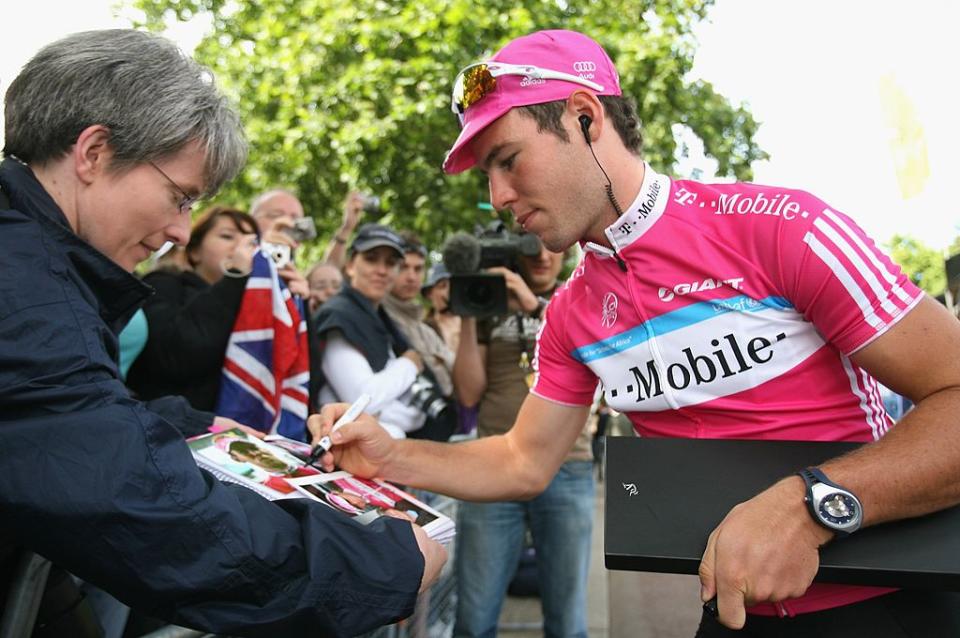
Cycling in Britain was about to explode when the Tour de France started in London in 2007 and Cavendish’s career was also ready for take-off after he joined the German team for his first full season as a professional.
Cavendish was only 22 but he had already won Scheldeprijs and captured the attention of the British media far more than Bradley Wiggins, David Millar or fellow debutant Geraint Thomas.
T-Mobile held their presentation at Jamie Oliver’s restaurant in East London and Cavendish had an ambitious swagger and a sprinter’s natural confidence. He dearly wanted to win a stage or at least be in the results but he crashed with 21km to go on the opening stage to Canterbury and was in tears at the finish, emotional about also losing a special pair of his beloved Oakley sunglasses.
He fought for other sprint opportunities when the Tour reached France, but further crashes left Cavendish battered and bruised, and he failed to finish stage 8 to Tignes in the Alps.
“We never got it right and he practically crashed nearly every single day. It was just too stressful for all of us, but you could see the potential was there,” Eisel recalled when speaking to Cyclingnews in 2021.
2008-2011: The imperial phase
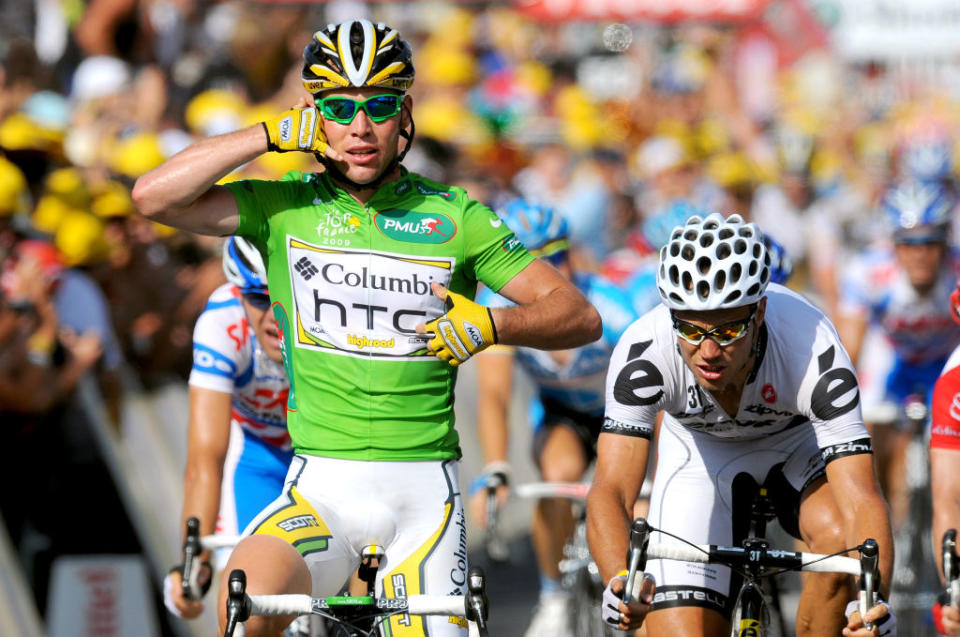
Cavendish’s first ever Tour de France win came on stage 5 to Châteauroux in 2008, where he would go on to win again in 2011 and in 2021.
He had already won two stages at the Giro d’Italia and carried his form into July while wearing the blue Team Colombia jersey, hungry for that first win in France. It was the start of Cavendish’s peak at the Tour.
On the stage to Châteauroux, the break was only caught in the long and straight final kilometre and Cavendish opted to go early, sprinting down the middle of the road with confidence. He held off Oscar Friere and Erik Zabel and put his hands on his head in astonishment when he realised he had won.
“It’s the biggest thing to happen to me without a doubt," Cavendish said immediately after the sprint. "To win a stage is massive and to win it so young is amazing."
Cavendish didn’t start stage 15 due to fatigue but by then he had won three more stages in Toulouse, Narbonne and Nîmes.
“He always had that passion and dedication for the Tour, even when he was an immature kid who had just won his first Tour stage,” Eisel explained. “Winning in Châteauroux in 2008 changed everything. From there it just snowballed.”
Cavendish won Milan-San Remo on his debut in early 2009 and then won six stages in the Tour that year in the bright yellow and white of HTC-Colombia. Mark Renshaw was now his trusted lead out-man and they dominated the sprints, including on the Champs-Élysées, where they finished first and second.
The bar was now set very high indeed, and the weight of expectation was evident when Cavendish burst into tears on the podium after opening his account for the 2010 Tour on stage 5 in Montargis. The early part of his 2010 season had been blighted by problems and he had begun the Tour with a crash on stage 1, but now he was up to speed, adding another four wins before Paris.
Cavendish would again claim five stage wins in 2011. In this era, he was virtually unbeatable in a sprint and was angry and frustrated whenever any beat him to the line, such was his ambition and drive.
In four editions of the Tour between 2008 and 2011, Cavendish won 20 times, thus claiming over a quarter of the stages he contested. His consistency in 2011 also secured him the green points jersey. The year would end with a coronation in Copenhagen as he added the rainbow jersey of world champion.
2012: Sky proves a limit
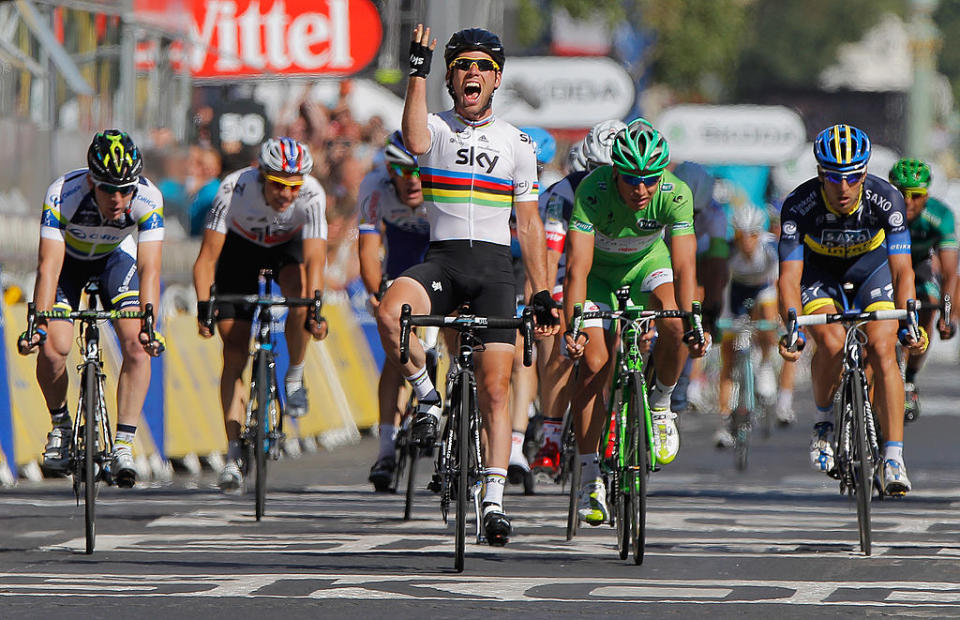
With Bob Stapleton unable to find a sponsor, 2011 marked the end of an era and Cavendish joined Team Sky to race in the rainbow jersey.
The British team was targeting overall victory at the Tour de France in 2012 with Bradley Wiggins but they made room in their line-up for Cavendish and Eisel after he won a string of races in the spring.
Cavendish won in Tournai on stage 3, beating former nemesis Andre Greipel and in Brive in the final week, before he claimed a fourth successive win in Paris, with Wiggins helping in the lead-out while wearing the yellow jersey. It was the highpoint of their close but occasionally conflicting relationship, with Cavendish opting to leave Team Sky after just a year. Team Sky was focused on marginal gains and Grand Tours, while Cavendish went his own way in search of more sprint wins.
2013-2015: Harrogate crash and the first QuickStep years
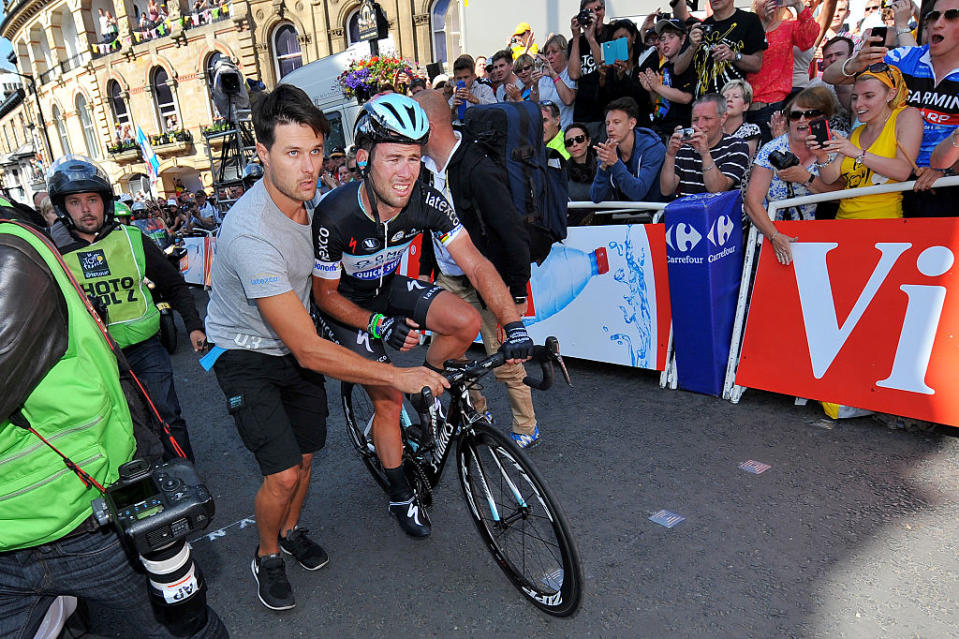
Cavendish joined Omega Pharma-QuickStep in 2013 and started a new phase in his career and Tour de France sprinting that lasted until 2015.
2013 was prolific, with Cavendish winning five stages at the Giro d’Italia but he ‘only’ won two stages at the Tour de France, with a series of placings in four other sprints leaving him frustrated. For the first time, he suffered a defeat on the Champs-Élysées, losing out to Marcel Kittel.
The 2014 Tour de France started in Yorkshire and Cavendish hoped to win the opening sprint and take the yellow jersey in his mother’s hometown of Harrogate. However, he collided with Simon Gerrans with 200 metres to go, crashed hard and separated his shoulder. He enjoyed moments of huge success at the Tour across the years but also of pain and disappointment.
The 2015 Tour de France also proved to be laborious, with just five sprint finishes, and Cavendish’s lone victory came in Fougères.
He was ill by the time reached Paris and he was only sixth in the Champs Elysees sprint. That sparked doubts about his future at the Belgian team, with team manager Patrick Lefevere unable or unwilling to continue paying Cavendish’s salary.
2016-2019: Yellow jersey followed by wilderness years
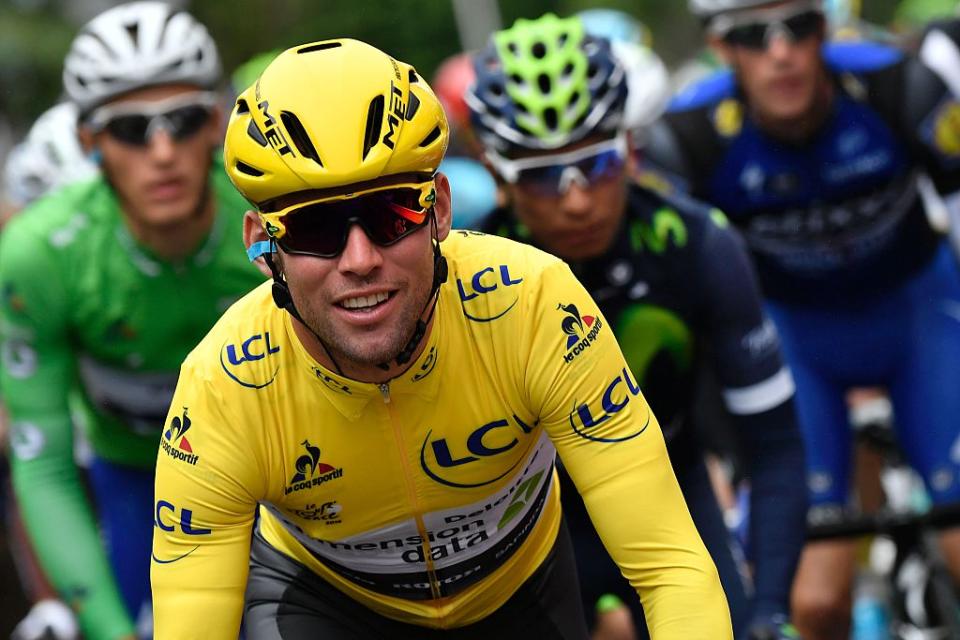
2016 was an Olympic year and Cavendish targeted gold in the Madison with Wiggins as well as winning big on the road at the Tour de France.
Olympic gold and the yellow jersey were the only things missing from his palmares and he wanted both after signing with Dimension Data, and he was even willing to leave the Tour early to travel to Rio.
Dimension Data reformed his lead-out train by signing Eisel and Renshaw for 2016 while Cavendish split his time between the road and track, giving his all to secure selection for the Great Britain team pursuit squad and pay Dimension Data back for their trust.
It left him on great form but also left him incredibly fatigued after a rollercoaster season of emotions, and he would pay a high price in 2017 and 2018.
Cavendish won stage 1 of the 2016 Tour de France in Sainte-Marie-du-Mont overlooking Utah Beach and emotionally kissed the yellow jersey on the podium. It was his 27th Tour win and his first for Dimension Data. He would add another three before leaving the Tour early to switch his focus to the Olympics.
Cavendish’s hopes of Olympic gold also ended badly when Wiggins was far from his best in the Madison after peaking for the team pursuit. That left Cavendish fuming but he got back to his best to finish second in the road race World Championships in Doha behind Sagan.
Cavendish’s 2017 Tour ended on stage 4 when Sagan closed the door on him along the barriers in the Vittel sprint. Cavendish went down at speed and fractured his collarbone, with Sagan disqualified from the Tour. The dispute about who was fault ended their relationship for ever.
Cavendish was first diagnosed with Epstein-Barr in early 2017 and he was forced to take long breaks from racing during that season and especially in 2018. He missed a big part of the 2018 spring but thought he had recovered for the Tour. However, he struggled to be competitive in the Tour sprints and finished outside the time limit on the mountain stage to La Rosière.
Cavendish would later reveal that he suffered with depression during his three-year fight to return to full health. He blamed Dimension Data’s medical staff for struggling to diagnose his illness and his relationship with team manager Doug Ryder broke down in 2019 when he was not selected for the Tour de France.
2021: The incredible comeback at QuickStep
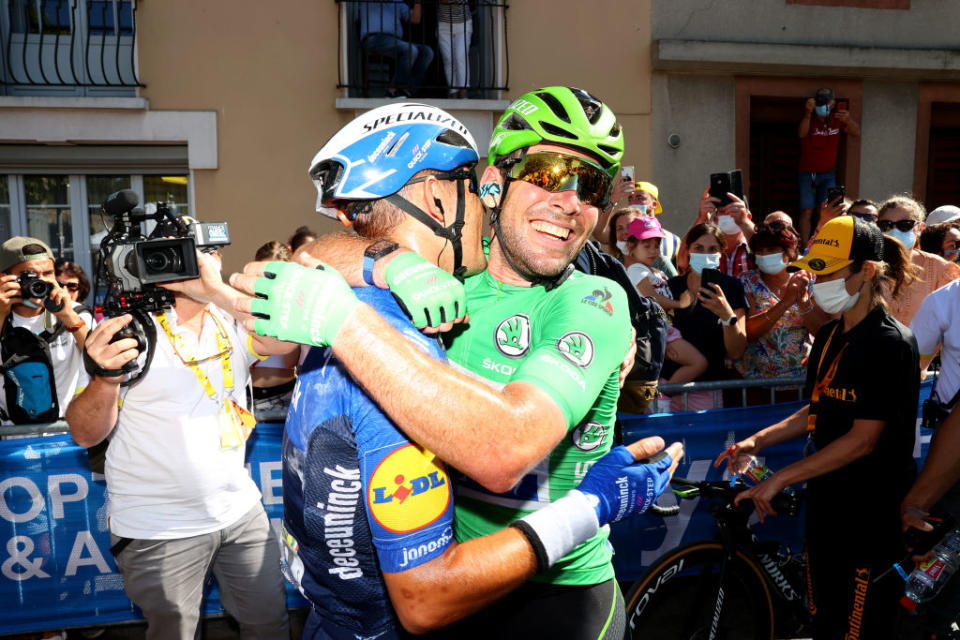
Cavendish also missed the Tour de France in 2020 when it was held in late summer due to the COVID-19 pandemic, a season when he was given a lifeline by his former coach and mentor Rod Ellingworth at Bahrain-McLaren.
His career seemed over in late 2020, Cavendish admitting as much and in tears, after riding Gent-Wevelgem. Yet he managed to persuade Patrick Lefevere to give him a place at what was then Deceuninck-QuickStep, finding the sponsorship to cover his limited wages, so he could have one last shot at keeping his career alive.
Destiny stepped in to pay Cavendish back for his determination. Sam Bennett was unable to ride the 2021 Tour de France due to injury and so Cavendish got a late call-up.
He grabbed the opportunity, combined perfectly with leadout man Michael Mørkøv and won four stages at the Tour and took the green jersey. He won in Châteauroux for a third time in his long career and then equalled Eddy Merckx’s 34-stage win record in Carcassonne.
Cavendish could have won his 35th victory on the Champs-Élysées but he was only third behind Wout van Aert and Jasper Philipsen as yet another new generation of riders emerged.
Although Cavendish and Lefevere eventually reached an agreement for 2022, it was soon clear that he was not the number one sprinter at the team. Fabio Jakobsen rode the Tour de France as QuickStep’s lead sprinter, while Cavendish had to settle for a stage win at the Giro and a second British national road title.
He was set to lead the B&B Hotels teams in 2023 but was strung along like everyone else involved, finally admitting in the final months of 2022 that he was desperately looking for a team to keep his career alive.
2023: The last hurrah at Astana
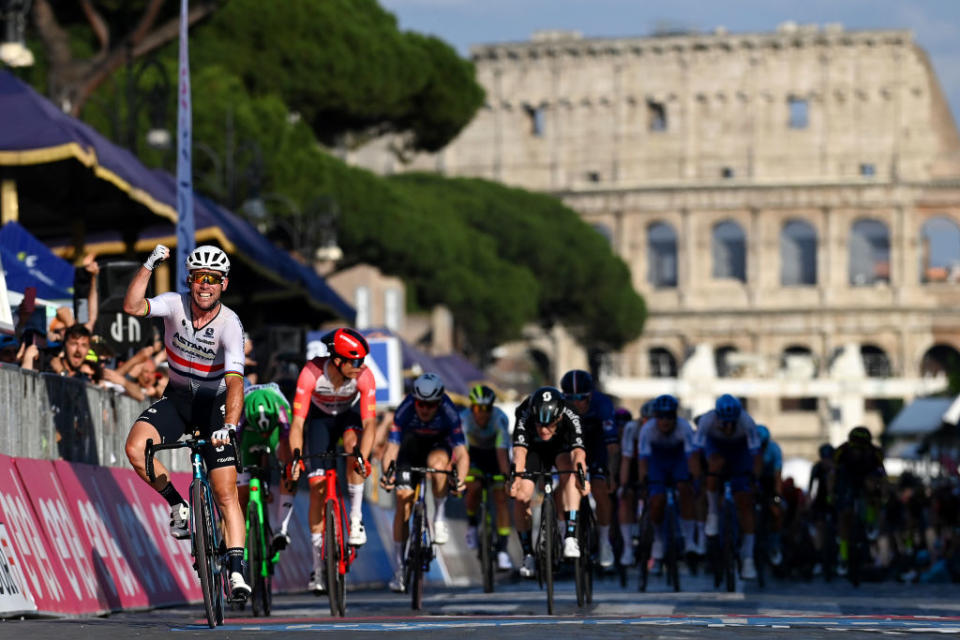
After weeks of negotiations and sightings of Cavendish training in Spain, Astana Qazaqstan announced his signing in January and began to build a lead-out train as they pivoted to become a sprint team. Results in the early months were lacking but the goal was always about winning one more stage at the Tour de France.
Cavendish won in Rome at the Giro d’Italia a few days after confirming that 2023 would be his final season, once again proving he should never be written off.
The 2023 Tour de France will be 14th and his last, each sprint finish a chance for him to win a 35th stage and so make history as the record holder of stage victories at the Tour. It could be the fairytale ending for Cavendish.

